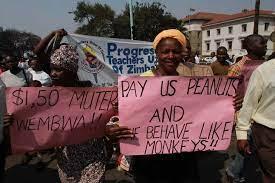News / National
Bonuses for civil servants will be paid starting Friday next week
03 Nov 2024 at 10:05hrs |
1 Views

Starting Friday next week, Zimbabwean public sector employees will begin receiving their 2024 annual bonuses, with the first 50 percent instalment to be paid alongside November salaries and the remaining 50 percent in December. The split payment approach is intended to ease strain on the banking system and reduce long queues at banks.
The disbursements will commence with security service personnel, followed by health sector workers, educators, and other civil servants. Traditional leaders and their messengers, as in previous years, will also be included in the bonus payments.
According to Mr. Simon Masanga, Permanent Secretary in the Ministry of Public Service, Labour, and Social Welfare, the Government has already implemented a recent salary increase for public sector workers. This raise is part of a cost-of-living adjustment to offset the impact of the Zimbabwe Gold (ZiG) currency devaluation.
"A salary agreement was signed, and the cost-of-living adjustment has been paid with arrears," Mr. Masanga confirmed, noting that payment specifics are managed by the Treasury.
Typically, public sector bonuses are paid in November and December. Zimbabwe Confederation of Public Sector Trade Unions (ZCPSTU) chairperson Mrs. Cecilia Alexander welcomed the arrangement, emphasizing that the bonus will indeed be split across two instalments. "The first 50 percent will come with the November salary, and the remainder will be paid in December," she stated.
The National Joint Negotiating Council (NJNC), the platform for Government and civil servant discussions, recently concluded negotiations that resulted in a salary review to sustain employees' purchasing power amid economic changes. Last month, Finance Minister Professor Mthuli Ncube announced a salary hike to counter the 42 percent devaluation of the ZiG, ensuring that public sector earnings better align with prevailing economic conditions.
In addition to these adjustments, the Government has committed to improving public sector conditions by providing incentives such as affordable transport, housing, and duty rebates on motor vehicle purchases.
The relationship between Government and civil servants has reportedly improved as both parties demonstrate a readiness to engage in constructive dialogue, contributing to more favorable outcomes in recent negotiations.
The disbursements will commence with security service personnel, followed by health sector workers, educators, and other civil servants. Traditional leaders and their messengers, as in previous years, will also be included in the bonus payments.
According to Mr. Simon Masanga, Permanent Secretary in the Ministry of Public Service, Labour, and Social Welfare, the Government has already implemented a recent salary increase for public sector workers. This raise is part of a cost-of-living adjustment to offset the impact of the Zimbabwe Gold (ZiG) currency devaluation.
"A salary agreement was signed, and the cost-of-living adjustment has been paid with arrears," Mr. Masanga confirmed, noting that payment specifics are managed by the Treasury.
Typically, public sector bonuses are paid in November and December. Zimbabwe Confederation of Public Sector Trade Unions (ZCPSTU) chairperson Mrs. Cecilia Alexander welcomed the arrangement, emphasizing that the bonus will indeed be split across two instalments. "The first 50 percent will come with the November salary, and the remainder will be paid in December," she stated.
The National Joint Negotiating Council (NJNC), the platform for Government and civil servant discussions, recently concluded negotiations that resulted in a salary review to sustain employees' purchasing power amid economic changes. Last month, Finance Minister Professor Mthuli Ncube announced a salary hike to counter the 42 percent devaluation of the ZiG, ensuring that public sector earnings better align with prevailing economic conditions.
In addition to these adjustments, the Government has committed to improving public sector conditions by providing incentives such as affordable transport, housing, and duty rebates on motor vehicle purchases.
The relationship between Government and civil servants has reportedly improved as both parties demonstrate a readiness to engage in constructive dialogue, contributing to more favorable outcomes in recent negotiations.
Source - The Sunday Mail
Join the discussion
Loading comments…




























